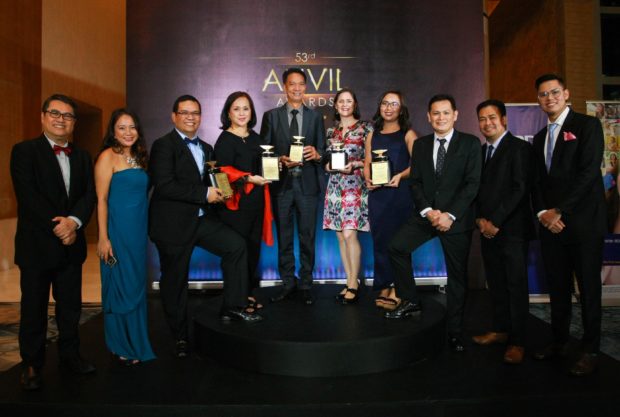
UNICEF WASH. Chief Louise Maule and Department of Health Engr. Rolando Santiago (center), together with officials from UNICEF and implementing partner, Center for Health Solutions and Innovations Philippines (CHSI), receive three Gold Anvil Awards and two Silver awards during the Public Relations Society of the Philippines 53rd Anvil Awards. CONTRIBUTED PHOTO
Two UNICEF-supported campaigns on water, sanitation, and hygiene (WASH) have reaped five honors during the recent 53rd Anvil Awards of the Public Relations Society of the Philippines.
“Goodbye, Dumi! Hello, Healthy!” (GDHH) received a Gold Anvil award for sustained implementation, under the Advocacy Campaigns category. GDHH supports the Zero Open Defecation (ZOD) Program of the Department of Health (DOH).
Local non-government group Center for Health Solutions and Innovations Philippines, Inc. (CHSI) designed GDHH. In partnership with the UNICEF and DOH, GDHH was launched initially in Masbate Province in 2015. The health program helped 20 barangays increase the number of households with sanitary toilets, and eliminate the practice of open defecation.
In 2016, it was expanded to four other regions in the country – Region V, Region VI, Region VIII, and Region XII.
“Our target is to achieve ZOD in all barangays by 2022. With the help of ‘Goodbye, Dumi! Hello, Healthy!’, we can reach this even before 2022,” said DOH Secretary Francisco Duque III.
According to UNICEF, the ZOD program can help the country address health and nutrition problems of children and their families.
“Open defecation poses the greatest risk to children’s nutrition. Children may suffer from diarrhoea, frequent bouts of worm infections and other diseases that impact their general health and lead to irreversible stunting,” noted Julia Rees, UNICEF Philippines Deputy Representative.
UNICEF WASH. Chief Louise Maule and Department of Health Engr. Rolando Santiago (center), together with officials from UNICEF and implementing partner, Center for Health Solutions and Innovations Philippines (CHSI), receive three Gold Anvil Awards and two Silver awards during the Public Relations Society of the Philippines 53rd Anvil Awards. CONTRIBUTED PHOTO
In 2017, the DOH launched GDHH as its health promotion campaign, with a series of trainings to help DOH regional offices and local governments roll out the campaign in communities where open defecation is widely practiced.
In 66 pilot barangays (villages) across nine provinces, the campaign has helped increase the proportion of households with sanitary toilets – from 60 percent to 85 percent in only eight months. So far, half of these barangays are already certified as ZOD communities.
The GDHH campaign won four other Anvils, including a Silver Award as one of the best and most effective campaigns for rural community development; while a children’s storybook about a house fly’s penchant for human feces won a Gold Anvil for communication tools.
The children’s storybook, “Ang Piyesta,” was authored by Dr. Luis Gatmaitan. Child development workers use the book to introduce pre-school children to the dangers of open defecation.
A curriculum guide for child development workers was also awarded a Gold Anvil as an effective communication tool.
These two communication materials are used in the “WASH and Learn” hygiene promotion program, developed by UNICEF and CHSI, to support the WASH in Early Childhood Care and Development (ECCD) program of the National ECCD Council.
WASH and Learn program also won a Silver Anvil as a program aimed at specific stakeholders.
Implemented in Puerto Princesa and Northern Samar, WASH and Learn helps children in day care centers adopt important hygiene practices like hand washing and brushing teeth. Over 500 child development workers were trained on how to use various communication tools as part of the WASH and Learn campaign.
The National ECCD Council will begin a series of training events on WASH and Learn, aiming to expand the program in different parts of the country in May 2018.
“We share this recognition with all the mothers, fathers and children who have made that important decision to build their own toilets after seeing or hearing about our campaign,” said DOH program officer Engr. Rolando Santiago. /kga